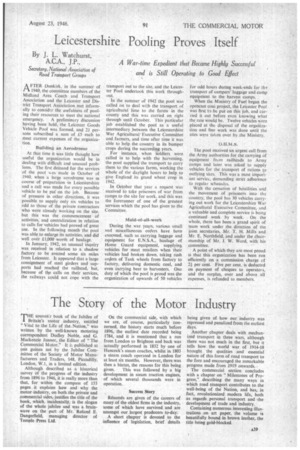Leicestershire Pooling Proves Itself
Page 41

If you've noticed an error in this article please click here to report it so we can fix it.
By J. L. Watchurst, A.C.A., J.P., A War-time Expedient that Became Highly Successful and is Still Operating to Good Effect
Secretary, National Association of Road Transport Groups AFTER Dunkirk, in the summer of 1940, the committee members of the Midland Area Coach and Transport Association and the Leicester and District Transport Association met informally to consichr the usefulness of pooling their resources to meet the national
emergency. A preliminary discussion having been held, the Leicester Goods Vehicle Pool was formed, and 21 persons subscribed a sum of £5 each to meet current expenses of the organization.
Building an Aerodrome At that time it was little thought how useful the organization would be in dealing with difficult and unusual problems. The first demand for the services of the pool as made in October of 1940. when a large aerodrome was in course of preparation in Leicestershire and a call was made for every possible vehicle to be pul on the job. Because of pressure in other directions, it was possible to supply only six vehicles to add to those of the private contractors who were already woiking on the site. but this was the commencement of activities, and centralization in relation to calls for vehicles had proved of great use. In the following month the pool was able to enlarge its activities, and did well over £1,000 worth of haulage. In January, 1942, an unusual inquiry was received in relation to a shadow factory to be erected some six miles from Leicester. It appeared that a large consignment of steel girders and supports had reached the railhead, but, because of the calls on their services, the railways could not cope with the transport out to the site, and the Leicester Pool undertook this work throughout.
In the summer of 1942 the pool was called on to deal with the transport of agricultural little to the farms in the county and this was carried on right through until October. This particular job established the pool as a useful intermediary between the Leicestershire War Agricultural Executive Committee and farmers, and time after time it was able to help the country in its bumper crops during the succeeding years.
For instance, when soldiers were called in to help with the harvesting. the pool supplied the transport to carry them to the various farms, working the whole of the daylight hours to help to give England its grand wheat crop in 1942.
In October that year a request was received to take prisoners of war from camps to the site for work, and this was the forerunner of one of the greatest services which the pool has given to the Committee.
Maid-of-all-work During the war years, various small and miscellaneous orders have been executed, such as carrying luggage and equipment for E.N.S.A., haulage of Home Guard equipment, supplying vehicles for meat retailers when their vehicles had broken down, taking rush orders of Tank wheels from factory to factory, delivering domestic coal, and even carrying beer to harvesters. One duty of which the pool is proud was the organization of upwards of 50 vehicles for odd hours during week-ends for the transport of campers' luggage and camp equipment to the harvest camps.
When the Ministry of Fuel began the opencast coai project, the Leicester Pool was first to be put on this job, and carried it out before even knowing what the rate would be. Twelve vehicles were placed at the disposal of the organization and fine work was done until the sites were taken over by the Ministry.
0.11.fv1.8.
The pool received an urgent call from the Army authorities for the carrying of equipment from railheads to Army camps and later was asked to supply vehicles for the transport of rations to outlying sites_ This was a most important service, demanding strict adherence to regular scheoules.
With the cessation of hostilities and the movement of prisoners into the country, the pool has 30 vehicles carrying out work for the Leicestershire War Agricultural Executive Committee, and a valuable and complete service is being continued week by week. On the whole, there has been a grand spirit of team work under the direction of the joint secretaries, Mr. T. H. Mills and Mr. E. Northfield, and under the chairmanship of Mr. J. W. Ward, with his committee.
A point of which they are most proud is that this organization has been run efficiently on a commission charge of 2i per cent. Five per cent, is deducted on payment of cheques to operators, and the surplus, over and above all expenses, is refunded to members.




































































